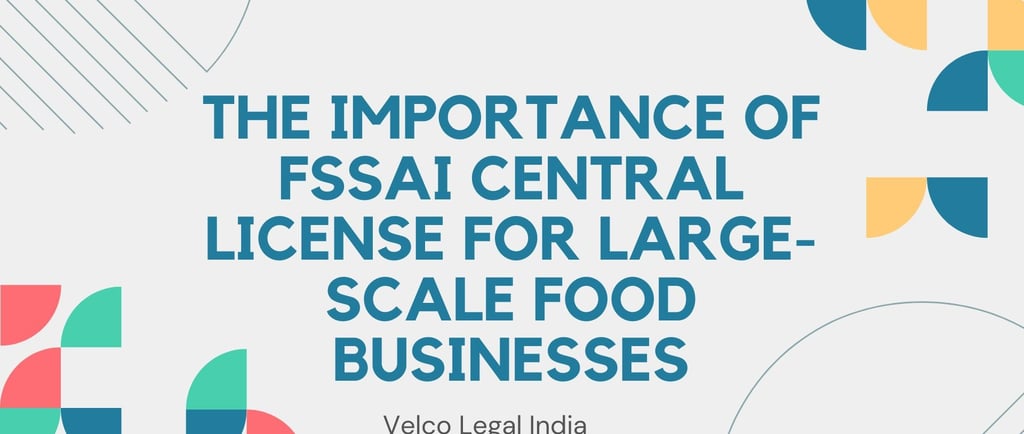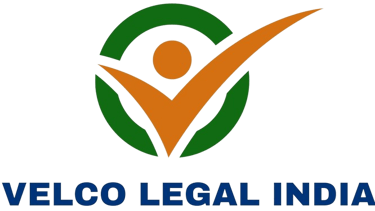The Importance of FSSAI Central License for Large-Scale Food Businesses
FOOD LICENCE
7/27/20247 min read


Introduction to FSSAI Central License
The Food Safety and Standards Authority of India (FSSAI) stands as a pivotal regulatory body aimed at ensuring food safety and hygiene across the nation. Established under the Food Safety and Standards Act, 2006, FSSAI is entrusted with the mandate to set scientific-based standards for food products and regulate their manufacture, storage, distribution, sale, and import to ensure safe and wholesome food for human consumption.
FSSAI operates through a well-structured licensing system to regulate food businesses. It offers three primary types of licenses, each tailored to the scale and nature of the business: the Basic Registration, the State License, and the Central License. The Central License, in particular, is crucial for large-scale food businesses, including those operating across multiple states or engaging in significant food production and distribution activities.
Eligibility for the FSSAI Central License is determined by specific criteria, primarily revolving around the annual turnover and operational scale of the business. Any food business with an annual turnover exceeding INR 20 crore, or those involved in food import and export, must obtain a Central License. Additionally, food businesses operating in airports, seaports, and railways, irrespective of their turnover, are also required to secure this license.
Large-scale manufacturers, processors, storage units, transporters, distributors, and retailers involved in the food sector are mandated to acquire the FSSAI Central License. This license ensures that these businesses adhere to the highest standards of food safety and hygiene, thereby fostering consumer trust and complying with national and international food safety regulations.
The FSSAI Central License serves as a crucial instrument in upholding food safety standards, ensuring that large-scale food enterprises operate within a stringent regulatory framework. By mandating compliance with established norms, the FSSAI Central License not only safeguards public health but also enhances the credibility and marketability of Indian food products on a global scale.
Legal Requirements and Compliance
Obtaining an FSSAI central license is a critical step for large-scale food businesses in India, ensuring they operate within the legal framework established by the Food Safety and Standards Authority of India (FSSAI). This license is mandatory for businesses with a turnover exceeding Rs. 20 crore annually or those engaged in food processing, manufacturing, and distribution across multiple states. The application process is stringent, requiring detailed documentation, including a business plan, proof of possession of premises, and an analysis of food products.
Compliance with FSSAI regulations is non-negotiable for maintaining the license. Key compliance standards include adherence to hygiene protocols, maintaining food safety management systems, and ensuring that all food products meet the prescribed quality standards. Businesses must implement Good Manufacturing Practices (GMP) and Good Hygiene Practices (GHP) to guarantee the safety and quality of the food they produce. Regular training for staff on hygiene and safety is also essential to stay compliant.
Furthermore, FSSAI mandates regular inspections and audits to ensure that businesses are consistently meeting these standards. Inspectors assess the cleanliness of the facilities, the quality of raw materials, and the overall safety protocols in place. Any deviation from the prescribed standards can result in severe consequences, including fines, penalties, and in extreme cases, shutdown of operations. Immediate corrective actions are necessary to address any non-compliance issues identified during inspections.
Non-compliance with FSSAI regulations can have significant repercussions. Apart from financial penalties, businesses may face legal actions, tarnished reputations, and loss of consumer trust. Repeated violations can lead to the revocation of the FSSAI license, effectively halting business operations. Therefore, adherence to legal requirements and maintaining compliance should be a top priority for large-scale food businesses to ensure their long-term success and sustainability in the market.
Benefits of Holding an FSSAI Central License
Obtaining an FSSAI Central License offers numerous benefits for large-scale food businesses, making it a crucial element for success and sustainability in the competitive food industry. One of the primary advantages is enhanced credibility and consumer trust. As the Food Safety and Standards Authority of India (FSSAI) is a central regulatory body, its certification is widely recognized and respected. This endorsement assures consumers that the food products meet stringent safety and quality standards, thereby boosting confidence and loyalty among customers.
Another significant benefit is the facilitation of business expansion. With an FSSAI Central License, food businesses can seamlessly scale their operations across multiple states. This is particularly advantageous for large-scale enterprises that aim to widen their market reach. The centralized license eliminates the need for multiple state-level licenses, streamlining regulatory compliance and reducing administrative burdens.
Moreover, holding an FSSAI Central License opens up opportunities for exports. The global food market is highly regulated, and international buyers often require proof of adherence to safety standards. An FSSAI Central License serves as a testament to the quality and safety of the products, making it easier for businesses to penetrate international markets and establish a global presence. This can lead to increased revenue and growth opportunities.
Improved operational efficiency is another notable benefit. The process of obtaining the FSSAI Central License involves rigorous checks and adherence to strict guidelines. This encourages businesses to implement best practices in food safety and quality management, leading to more efficient and streamlined operations. Efficient operations, in turn, can result in cost savings and better resource management.
Finally, an FSSAI Central License provides a competitive edge in the market. In an industry where consumer awareness and demand for quality are continually rising, having a recognized certification sets a business apart from its competitors. It signals a commitment to maintaining high standards, thereby attracting discerning customers and potentially leading to increased market share.
Application Process and Documentation
Securing an FSSAI central license is a crucial step for large-scale food businesses in India, ensuring compliance with food safety regulations. The application process comprises several steps, each demanding meticulous preparation and attention to detail. To initiate the process, businesses must access the Food Safety and Standards Authority of India (FSSAI) website and register online. The registration requires filling out Form B, which is the primary application form for the FSSAI central license.
Once the form is completed, the next step involves gathering the necessary documentation. The essential documents include a copy of the business registration certificate, which verifies the legal status of the enterprise. Additionally, a detailed food safety management plan (FSMP) is required. This document outlines the protocols and procedures the business follows to maintain food safety standards. Ensuring this plan is comprehensive and adheres to FSSAI guidelines is critical for a successful application.
Another vital document is proof of address, which can be substantiated through utility bills, lease agreements, or any official document indicating the business's location. For companies operating from multiple locations, documentation for each site must be provided. Additionally, a list of food products the business manufactures or handles needs to be submitted. This list should include detailed product descriptions and categories as specified by FSSAI.
After compiling all required documents, the next step is to upload them through the FSSAI online portal. It is advisable to double-check each document for accuracy and completeness before submission. Errors or omissions can lead to delays or even rejection of the application. Once submitted, the FSSAI authorities review the application and may request additional information or clarification if needed.
The typical timeline for approval of an FSSAI central license application ranges from 60 to 120 days, depending on the completeness of the application and the responsiveness of the applicant to any queries from FSSAI. To expedite the process, businesses should ensure all documentation is accurate and promptly respond to any requests for additional information.
Challenges and Solutions in Maintaining Compliance
Large-scale food businesses often encounter various challenges in maintaining compliance with FSSAI regulations. One significant hurdle is the frequent updates to safety standards. The Food Safety and Standards Authority of India (FSSAI) regularly revises its guidelines to ensure consumer safety and market integrity. For large enterprises, keeping up with these changes requires substantial effort and resources. Additionally, the financial burden associated with compliance can be considerable. Investing in state-of-the-art equipment, quality control systems, and regular employee training programs can strain the budgets of even the most profitable organizations.
Managing large-scale operations adds another layer of complexity. With multiple production lines, vast distribution networks, and a large workforce, ensuring that every aspect of the business adheres to FSSAI regulations can be daunting. The risk of non-compliance increases with the scale of operations, potentially leading to severe penalties, product recalls, or even business closure.
To navigate these challenges, food businesses can adopt several best practices. First, regular training sessions for employees are essential. Keeping staff informed about the latest FSSAI standards and safety protocols helps maintain a high level of compliance. Investing in advanced quality control systems is another vital strategy. These systems can automate many compliance checks, reducing human error and ensuring consistency in product quality.
Staying updated with regulatory changes is crucial. Businesses can subscribe to FSSAI newsletters, attend industry seminars, and participate in professional networks to stay informed about new guidelines and best practices. Additionally, appointing a compliance officer or forming a dedicated compliance team can help monitor and enforce adherence to regulations across all operational levels.
By addressing these challenges proactively, large-scale food businesses can not only achieve compliance with FSSAI regulations but also enhance their operational efficiency and consumer trust.
Case Studies and Success Stories
Real-life case studies and success stories of large-scale food businesses unequivocally demonstrate the tangible advantages of obtaining an FSSAI central license. One notable example is a leading dairy company that, after securing the FSSAI central license, witnessed a significant expansion in its market reach. Prior to obtaining the license, the company faced limitations in entering new markets due to compliance and regulatory challenges. However, the FSSAI certification provided the necessary validation, enabling them to access new regions and significantly boost their sales.
Another compelling success story is that of a prominent food processing firm. This company, which specializes in ready-to-eat meals, leveraged the FSSAI central license to enhance consumer trust. The license served as a mark of quality and safety, leading to a surge in customer confidence and loyalty. As a result, the firm's brand reputation improved, and it experienced a notable increase in repeat customers and positive reviews. This case underscores how compliance with FSSAI regulations can directly impact consumer perceptions and brand value.
The benefits of obtaining an FSSAI central license are also evident in the case of a multinational snack manufacturer. This company's adherence to FSSAI standards facilitated smoother operations and regulatory compliance, thereby reducing the risk of legal issues and penalties. Additionally, the license played a crucial role in fostering partnerships with international retailers, as it assured them of the product's safety and quality. Consequently, the manufacturer successfully expanded its global footprint, entering new international markets and achieving substantial business growth.
These success stories highlight the practical advantages of securing an FSSAI central license for large-scale food businesses. By ensuring compliance with stringent food safety standards, companies can not only enhance their marketability and consumer trust but also achieve significant operational and financial growth. These real-world examples serve as an inspiration and provide actionable insights for other businesses aiming to achieve similar success through FSSAI compliance.
Velco Legal India
+91 7300003182 / +91 7300003184
Disclaimer: This website is a property of a consultancy firm, providing consultancy services w.r.t. Food License.
We expressively declare that we are private consultants. © 2022 velcolegalindia.com - All Rights Reserved.
